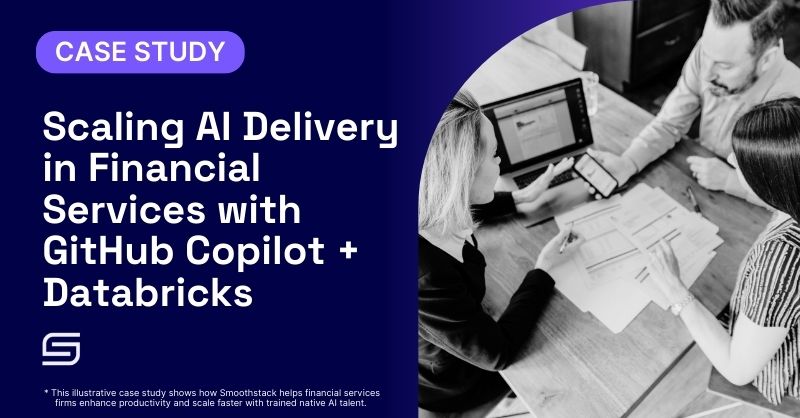Scaling AI Delivery in Financial Services with GitHub Copilot + Databricks

How Smoothstack helped a leading financial services firm close skills gaps, scale talent pipelines, and accelerate delivery with AI workforce development
Accelerating AI in Financial Services
Financial services firms are under pressure to deliver faster, more innovative solutions while maintaining strict regulatory compliance. Tools like GitHub Copilot Enterprise and Databricks promise to accelerate software delivery and data-driven innovation. But adopting these platforms at scale requires more than just technology – it requires skilled talent that can integrate AI into enterprise environments from day one.
That’s where Smoothstack stepped in.
The Challenge
When a leading financial services company set out to roll out GitHub Copilot Enterprise and Databricks, it faced several hurdles:
- Skills gap: Existing teams lacked engineers with experience integrating AI copilots and ML workflows into regulated financial systems.
- Resourcing uncertainty: Leadership wasn’t sure if the workforce could absorb the new workload or whether 10 or 100 additional engineers would be needed once projects launched.
- Long ramp-up: New hires typically required 6–9 months to reach full productivity, delaying time to value.
- Delivery pressure: Business stakeholders expected faster project execution than existing teams could deliver.
The Solution
The company partnered with Smoothstack to address these challenges with a workforce development model built for enterprise environments:
- Mirrored Environment Immersion (MEI™): Engineers trained in a replica of the client’s stack Copilot – enabled IDEs, Databricks pipelines, and CI/CD workflows – so they could contribute on day one.
- Flexible engagement model: The client began with a small cohort and scaled engineering capacity each quarter as project demands grew, with the flexibility to convert proven engineers into direct hires.
- Native AI engineers: Smoothstack skilled up AI-native talent in data workflows and enterprise platforms, preparing them to operationalize copilots, automate code reviews, and accelerate model deployment.
The Impact
By leveraging Smoothstack’s MEI™ training framework, engineers were productive immediately, eliminating the typical 6–9 month ramp-up.
The flexible engagement model allowed leadership to avoid overcommitting resources. Instead of guessing whether 10 or 100 engineers would be required, the company scaled teams quarterly as workload demands evolved – preventing both bottlenecks and unnecessary costs.
Engineers trained on Copilot and Databricks delivered value in less than 90 days, with teams continuing to scale quarterly as needs grow.
Key results included:
- 65%+ Faster to Productivity: Engineers contributing on day one vs. 6–9 months.
- 30–40% Higher Velocity: Pull request cycles shortened by 30–40%.
- Ongoing Workforce Scalability: Engineering capacity continuing to expand each quarter without overstaffing.
Why It Matters
For enterprises in highly regulated industries, adopting new AI platforms can be daunting. This case study shows that with the right AI workforce development model, companies can move from pilot to production quickly, while scaling talent sustainably and reducing risk.
Let’s Build Your Team
Connect with the Smoothstack team to learn how to close your digital skills gap with a custom-trained team.